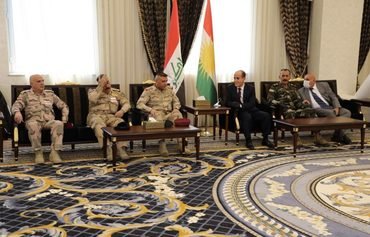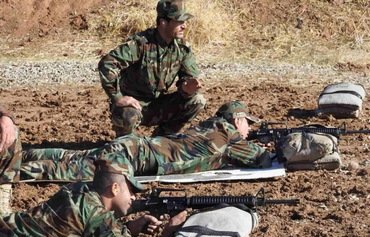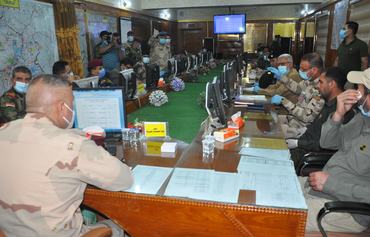Kurdish Peshmerga and Iraqi Security Forces (ISF) worked together in the latest phase of the "Heroes of Iraq" military campaign to clear the "Islamic State of Iraq and Syria" (ISIS) from Suleimaniyah and Diyala provinces.
The fourth phase of the operation began July 11th and was the result of a series of meetings on bilateral security that started in 2019.
Since ISIS overran swathes of Iraq in the summer of 2014, the forces have fought side by side in the battles to wrest territory back from the group.
But this collaboration saw a decline amid political tensions between the federal government and the Kurdish regional government following a September 2017 referendum which saw Iraqi Kurds back independence for their northern region.
![Collaboration between Iraqi Security Forces and Kurdish Peshmerga forces in the fourth phase of the 'Heroes of Iraq' military campaign is crucial for defeating ISIS and for improving the political situation, observers say. [Photo courtesy of Iraqi Counter-Terrorism Service]](/cnmi_di/images/2020/07/31/25180-Iraq-ISIS-operation-600_384.jpg)
Collaboration between Iraqi Security Forces and Kurdish Peshmerga forces in the fourth phase of the 'Heroes of Iraq' military campaign is crucial for defeating ISIS and for improving the political situation, observers say. [Photo courtesy of Iraqi Counter-Terrorism Service]
Securing the territory
ISIS had taken advantage of those tensions and managed to establish incubator cells in the absence of a strong security apparatus, officials say, adding that the success of the recent joint operation bodes well for future collaboration against the terrorist group.
"After the 2017 referendum, terrorists found a golden opportunity to hide and manoeuvre in the area separating Iraqi and Peshmerga forces," Ghalib Mohammed Ali, a Kurdish member of parliament representing Suleimaniyah province, told Diyaruna.
The area is vast, stretching across six provinces, and can span as wide or as deep as 15 kilometres in some areas.
The recent joint military operation covered several areas between Suleimaniyah and Diyala provinces which were considered safe havens for ISIS, Ali said.
These include Alyawah, Naft Khanah and Qura Taba, as well as villages located on the outskirts of Khanaqeen, Kifri, Buhaira and the Hamreen hills.
Remote areas have been secured and "dozens of hideouts and terrorist forts destroyed, thanks to the operation", Ali said.
He underscored the importance of continuing such joint operations and creating joint security checkpoints to control and secure the territory.
The area is attractive to terrorist elements due to its rugged terrain, the availability of agricultural land, and the proximity to oil fields and wells, which could provide a source of revenue for terrorist activity, Ali said.
"The ISF continue to prove their capabilities as a cohesive force, even in complex operations," US Air Force Maj. Gen. Kenneth P. Ekman said July 23rd, following the conclusion of the fourth phase of the "Heroes of Iraq" operation.
"Wherever [ISIS] seeks sanctuary, the ISF will find them," he said.
ISIS 'threat is receding'
Since the first phase was launched in June, the "Heroes of Iraq" campaign has covered nearly 18,000 square kilometres, from the border strip with Iran in north-eastern Diyala to the administrative border with the Kurdish region.
The fourth phase marks the launch of co-operation with Kurdish forces, which are part of Iraq's defence system and whose participation was crucial in defeating ISIS, said security expert Safa al-Assam.
"The bilateral collaboration is a welcome step that helps resolve political conflicts that have negatively affected the security situation in areas of contact, which terrorists have used as launchpads for their attacks," he told Diyaruna.
Part of the joint effort were landings and sweeps carried out by the Iraqi Counter-Terrorism Service and their Kurdish counterparts in areas that have not been reached by Iraqi forces since 2003.
Local officials also lauded the return of co-ordinated efforts between the ISF and Peshmerga forces.
"This is a big step on the right path," said Nizar al-Lahibi, administrative director of Bahraz in Diyala province.
"Resuming collaboration [with Kurdish Peshmerga forces] was necessary because ISIS had regrouped and was posing a growing threat to several towns in northern al-Muqdadiyah, Jalawla and Khanaqeen," he told Diyaruna.
Frequent terrorist attacks used to result in civilian and military deaths, but since the military campaign, he said, "the situation is stable and the threat is receding."

![Iraqi Counter-Terrorism Service forces and their Kurdish counterparts work together to track ISIS operatives as part of the fourth phase of the 'Heroes of Iraq' military campaign. [Photo courtesy of Iraqi Counter-Terrorism Service]](/cnmi_di/images/2020/07/31/25179-Iraq-Kurds-Arabs-600_384.jpg)






